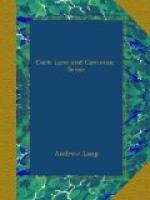On the following night, S. slept well, and if his bed did rise and fall gently, the movement rather cradled him to repose. In the afternoon, the bolts of his parlour door closed of their own accord, and the door of a large armoire opened. A voice then bade S. do certain things, which he was to keep secret, go to a certain place, and find people who would give him further orders. S. then fainted, hurt himself, and with difficulty unbolted his door. A fortnight later, S., his mother, and a friend heard more rapping, and a heavy knock on the windows.
M. Poupart now gives the explanations of common-sense. The early noises might have had physical causes: master, servants, and neighbours all heard them, but that proves nothing. As to the papers, a wind, or a mouse may have interfered with them. The movements of the bed are more serious, as there are several witnesses. But ‘suppose the bed was on castors’. The inquirer does not ask whether it really was on castors, or not, he supposes the case. Then suppose S., that melancholy man, wants a lark (a envie de se rejouir), he therefore tosses about in bed, and the bed rushes, consequently, round the room. This experiment may be attempted by any philosopher. Let him lie in a bed with castors, and try how far he can make it run, while he kicks about in it. This explanation, dear to common-sense, is based on a physical impossibility, as any one may ascertain for himself. Then the servants tried in vain to hold back the excited couch, well, these servants may have lied, and, at most, could not examine ’les ressorts secrets qui causaient ce mouvement’. Now, M. Poupart deserts the theory that we can make a bed run about, by lying kicking on it, and he falls back on hidden machinery. The independent witness is said to have said that he was sorry he spoke, but this evidence proves nothing. What happened in the room when the door was bolted, is not evidence, of course, and we may imagine that S. himself made the noises on walls and windows, when his friend and mother were present. Thus M. S. was both melancholy, and anxious se donner un divertissement, by frightening his servants, to which end he supplied his bed with machinery that made it jump, and drew the curtains. What kind of secret springs would perform these feats, M. Poupart does not explain. It would have been wiser in him to say that he did not believe a word of it, than to give such silly reasons for a disbelief that made no exact inquiry into the circumstances. The frivolities of the bed are reported in the case of Home and others, nor can we do much more than remark the conservatism of the phenomena; the knocks, and the animated furniture.




